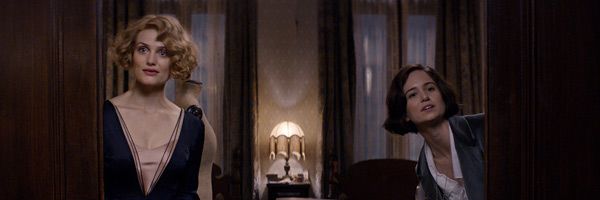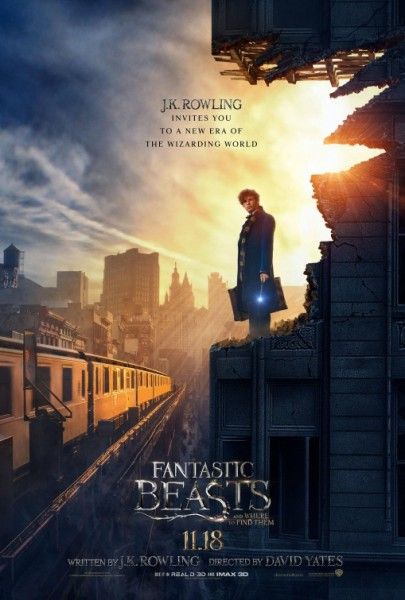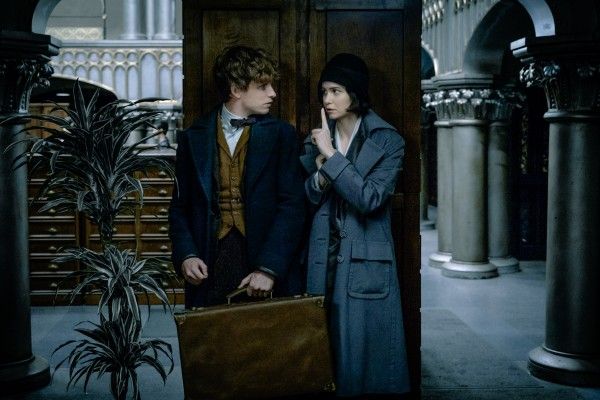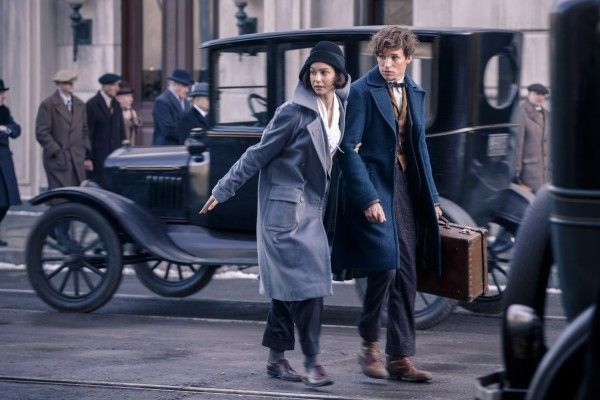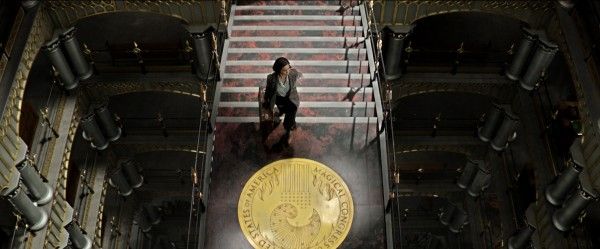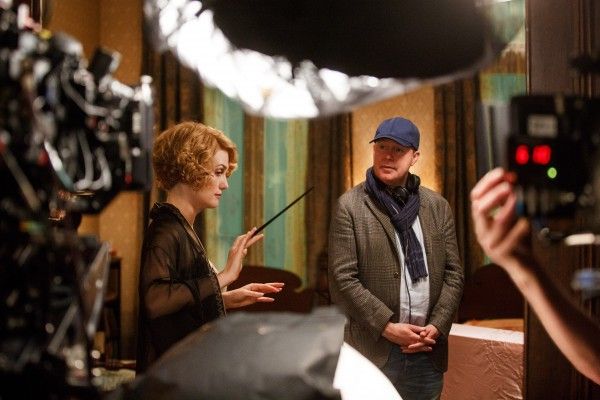The Harry Potter universe has always been full of female characters with dimensionality. One could reasonably make the argument that if it weren’t for Hermione, Harry and Ron would have succeeded at very little throughout the course of the Harry Potter saga. Author J.K. Rowling crafted incredible, complex characters throughout the series, and that was especially true of the women. And so with Fantastic Beasts and Where to Find Them, the upcoming 1920s-set spinoff that takes place in the same Wizarding World but with new characters, expectations are high for not just magic and world-building, but also fascinating female characters—especially since Rowling wrote the script.
That’s certainly true of Katherine Waterston’s Tina, a witch and former Auror who works for the Magical Congress of the United States of America and, having lost her place as Auror, has something to prove. Tina crosses paths with Eddie Redmayne’s magizoologist Newt Scamander and is one of the main characters that gets wrapped up in the madness that occurs when Scamander’s magical creatures run loose in New York City.
Last year, I had the pleasure of visiting the London set of Fantastic Beasts and Where to Find Them along with a small group of reporters. During our time there, we got to speak with Waterston about her experience on the film, meeting J.K. Rowling, the intense secrecy, and much more. The actress broke out in a big way in Paul Thomas Anderson’s Inherent Vice, with a stunning follow-up turn in Steve Jobs, but Fantastic Beasts certainly marks a major step in her career, and it’s no coincidence that her next film after this is leading Ridley Scott’s Prometheus sequel Alien: Covenant.
While Waterston was pretty guarded about the film and her character, it was clear that she takes this character and this world very seriously. Get a peek inside the process of making a Wizarding World movie with the full interview below. Fantastic Beasts and Where to Find Them opens in theaters on November 18th.
Is it strange for you to realize we're a little less than a year out from the movie opening and people can buy your wand and that you'll be on toys and t-shirts and all that? Is that sort of strange in your future?
KATHERINE WATERSTON: Well, I did think about that a little bit when I was figuring out the costume and figuring out which wand to pick because I was just approaching it the way I always do. I mean obviously, this is my first wand but picking shoes for a character, the clothes and all the different things that you consider when you're figuring that stuff out during pre-production. And some of it has to do with practical needs and then specific little weird ideas you have about the character that nobody else ever knows about—and that all of those decisions were ultimately going to maybe wind up on a doll or something. It seems so weird. It's kind of a wild thing because they’re so personal to me. Those decisions and which wand I picked and it's really almost an entirely private matter. There were things about one wand I was attracted to over another, I never talked to anybody about. You know, I didn't talk to David [Yates] about it or anything. It just was like, yeah, this makes more sense for Tina but you know, then that's going to go into some kind of mass production. (laughs) It's really so strange.
We had a chance to visit the MACUSA set and it's really beautiful, but one thing that a couple of us noticed is that there's these statues of presumably pre-eminent wizards that are kind of up on the columns around there. And we noticed that they're all men. And you can imagine that perhaps in a 1920s government there's not much female representation... Is that something that your character deals with at all? Does she feel those pressures?
WATERSTON: Are they really all men? That confuses me and I can't even tell you why… So, what was really important to me was that [the wand] was heavy enough 'cause initially it wasn't heavy enough and also that it was sort of simple because you know the wands pick you. And I was wondering what a wizard would feel like when their wand picked them, what it looked like, would you think, “Oh, maybe this is a bad sign,” that it's not so special looking; “Is this gonna mean I'm not gonna be much of a wizard or something?” You know or a witch so, anyway, that was the question that I wanted to have so, that's why it's simple. But to answer your question I feel like there's the period the film is set in but then there's also a lot of sort of magical permission a little bit in the world we're creating. It's doesn't seem to be divided by race or sex in ways that the world was in the 20s or in the way America was in the twenties. We have a female President. Is that a secret? There are different rules than our world.
What was it like to kind of become the next big female character from the Harry Potter universe when Hermione's become like an icon since those books came out and kind of taking on that mantle of someone people probably will look up to?
WATERSTON: It never occurred to me to compare myself to her just because we're both female, in any way. You know, they're totally different characters and I don't feel like I'm stepping into her shoes simply because I'm a woman. It's just amazing to be a part of this world that means so much to people and I don't have any problem with considering it in that way. It just never occurred to me to think of it in those terms and probably it would make me nervous at the thought of it (laughs) because she was so good in those films. So, I just don't think about that.
Alison was saying you guys had a little bit of freedom especially since these aren't characters that readers already know. So, how did your character develop once you took on the role and started having conversations with David and maybe J.K. Rowling?
WATERSTON: Yeah, it's strange because the last two films I did were based on books. One was based on a biography and obviously I was playing a real person in the film. Before that was based on a work of fiction so, I had like a lot of experience recently working with that kind of guide. They’re both really fun ways to work because when you have the material then you can kind of mine it and re-read things and you know, two people read the same book and have a totally different idea of what a character will look like, all that stuff and it's so personal. So, I really enjoy having that but then, of course, without it you kind of have more responsibility as an author in a way. Obviously we have the script but to fill in those blanks—it's kind of hard to measure if you work more at that kind of development. When you have the source material or not...
Did it change very much from what was on the page at the beginning to when you started shooting?
WATERSTON: I mean again it's sort of the same way as when you read a book. It's the same thing when you read a script. Sometimes we'll walk into a set and I'll think, oh, this film doesn't look like this. You know, 'cause I read the script and I saw it in my head in some other way. Which is a lot like what happens when they're writing a movie that's based on a book, I'm like, “Ah! He doesn't have a beard.” You have these visions in your head about it. But I feel like you come in with some sort of good foundation for who the character is and then it does grow and change every day. You have to be available to let that happen as it goes because every scene is a discovery, informs the character more and that's what's so much fun about working on something that takes a long time to shoot, because you have more time to live with the character.
It's seems like from what we're hearing is that Newt has kind of been spending a lot of time with these creatures that he's studying. And Tina, it seems like she's maybe reserved, might be by the book. I don't know how she is socially, but I'm curious to know how these two characters find a connection.
WATERSTON: Well, so you know that's something that even if I was allowed to talk about, I probably wouldn't want to talk about because it's so much fun to go to a movie and find out how people connect, and what that's about and the gift of this one is that you guys don't know. Do you know what I mean? Because they aren't the book so, I feel like it's a nicer thing for me to do to not tell you about that because then you can get to find out by watching it.
Were there any rituals that you did? Or any music that you listened to or anything to really get into the character of the period and the actual character?
WATERSTON; You know, I guess, what is it like, Superman goes into the phone booth to change or something, I feel like there's sort of this idea that that's how actors work that we have to like, place ourselves somewhere and then suddenly the character (laughs) emerges or something and I feel like it's a lot more there's no kind of guarantee like that. Like, one day the way the shoes make me walk might really ground me or something and another day I might just feel like, eh, these are just shoes and I have no connection to it and then you need something else or some days you just don't know why but you just don't have to do anything at all to help bring yourself into the moment of the world. It's just there for you, so, I don't have like a “Thank God I have this song to play because without it who knows if I would've been able to find this character” or something.
But you know, a lot of the actors are listening to music from the period. So, sometimes it's also just like the atmosphere can be helpful. You hear something coming from another trailer and you're like, oh, right, yeah, of course, it's the 20s. Seeing all the extras around who—there's 11,000 extras that will pass through this film by the time we wrap. And I've never worked on a film like that. Even films I've worked on that have like lots of street scenes, because the budget was low they either recycling extras or are finding ways to justify or angles to shoot out to use fewer people. I feel really grateful to them on this because they do a lot of the work for me, too. I remember, I think it was the first day of shooting I rounded a corner that is a New York City street corner that had been built here, and it wasn't just extras walking around in costume. It was, that's a couple and they're having a fight and they got into a car accident and there's a mechanic there fixing it.
And there's just all of this detail and so much of it, no one will ever see. Sometimes, I'd look at the angle of the cameras and I think, "All those guys on the trollies back there." Like maybe no one's gonna see them on those trollies but I can see them and I can feel them and they are giving me a lot to make myself feel, trick my brain into thinking I'm in this world and so, I don't remember the question but that's something that's going on. (laughs)
Speaking to those details, when we were on the set of MACUSA there were all these small little details, like one slip of paper where you have to like document what spells you cast in on your visit.
WATERSTON: Were there were loads of desks where you were?
Yeah, so I'm curious because we've had eight films and the books to figure out how the British wizarding world operates. What can you tell us about what the day to day life of like the American Ministry of Magic is like? What are their concerns?
WATERSTON: I mean there's like a big concern I'm pretty sure I definitely am not allowed to talk about that's going on in this film. As you saw there's like a lot of bureaucracy and—you probably saw the tube things coming off the desks so, we're like using delivery systems of the period but in a much more magical way. I'm not sure if I'm allowed to say how. I keep saying things like this to you guys to see if you're gonna be like, oh, right, they told us that already. (laughs) When I see blank faces I'm like, nope, not that. But that's like again another cool way that we're mixing the sort of magical world with the period, aesthetically. But there's like a very clear power structure and… (laughs) some people are more powerful but not unfair. I'm nervous to tell you anything. Oh, my God...
I was gonna ask you about the political feel in the atmosphere of the movie because it seems to be a lot more focused on the American Congress than the Ministry of Magic ever played in the British Harry Potter world. And we have a lot of central characters that work within MACUSA so, I was gonna ask you just in general, how American politics has an influence in it?
WATERSTON: Well, I don't know. I sort of feel like that's a better question for Jo 'cause it's her invention but I think part of it might be just due to the fact that this is a story about adults. I mean we're not in the classroom because we're adults, you know what I mean and so, it's just sort of a natural place where they would go once they've all grown up. And then, I think, also, there is this factor of the outsider in America that is part of why— (laughs) So, boring, I'm like you know what I mean—I can't tell you anything.
Can you talk about meeting J.K Rowling, and your first thoughts about when you first read the script? Like, what you thought of it...
WATERSTON: Well, I just met her. So, that I can answer more easily probably 'cause that's more fresh in my mind than the first time I read the script which is now like, seven months ago. But we all just kind of stared at her and smiled (laughs) Kinda dumbfounded to be finally meeting her and then, almost as soon as we started speaking to her, she started to do kinda what I imagined she would do and was hoping she would do when we met her which is just start telling us stuff 'cause she has this encyclopedic knowledge of this world. It really exists in her mind and to such incredible detail so, I just had to fight the urge to like pull her into a corner and just hog her about Tina questions 'cause I know she probably knows like how I skinned my knee when I was five or whatever. You know what I mean? Like, she just has that kind of detailed mind. And then when I first read the script I just thought it was beautiful. It was really moving and really didn't feel like “Number Nine”. You know it didn't feel like this sort of tired thing. It felt really fresh and new, which was what was so appealing about it to me. And also just moving and so, you know, now we just sit around biting our nails hoping that the movie's as good as the script. 'Cause we started off with a good thing which is a good, good way to choose projects, you know.
Catch up on all of my Fantastic Beasts and Where to Find Them set visit coverage by perusing the links below:
- ‘Fantastic Beasts and Where to Find Them': 43 Things to Know About the New Wizarding World Story
- ‘Fantastic Beasts': Eddie Redmayne on How They Made the Creatures Come to Life on Set
- ‘Fantastic Beasts': Colin Farrell Explains Why He Wanted to Join the ‘Potter’ Universe
- Ezra Miller Details His Plans for His 'The Flash' and 'Fantastic Beasts' Action Figures
- ‘Fantastic Beats’ Was Originally Considered as a Documentary-Style Film
- ‘Fantastic Beasts’ Director David Yates Explains What Makes J.K. Rowling a Unique Screenwriter

